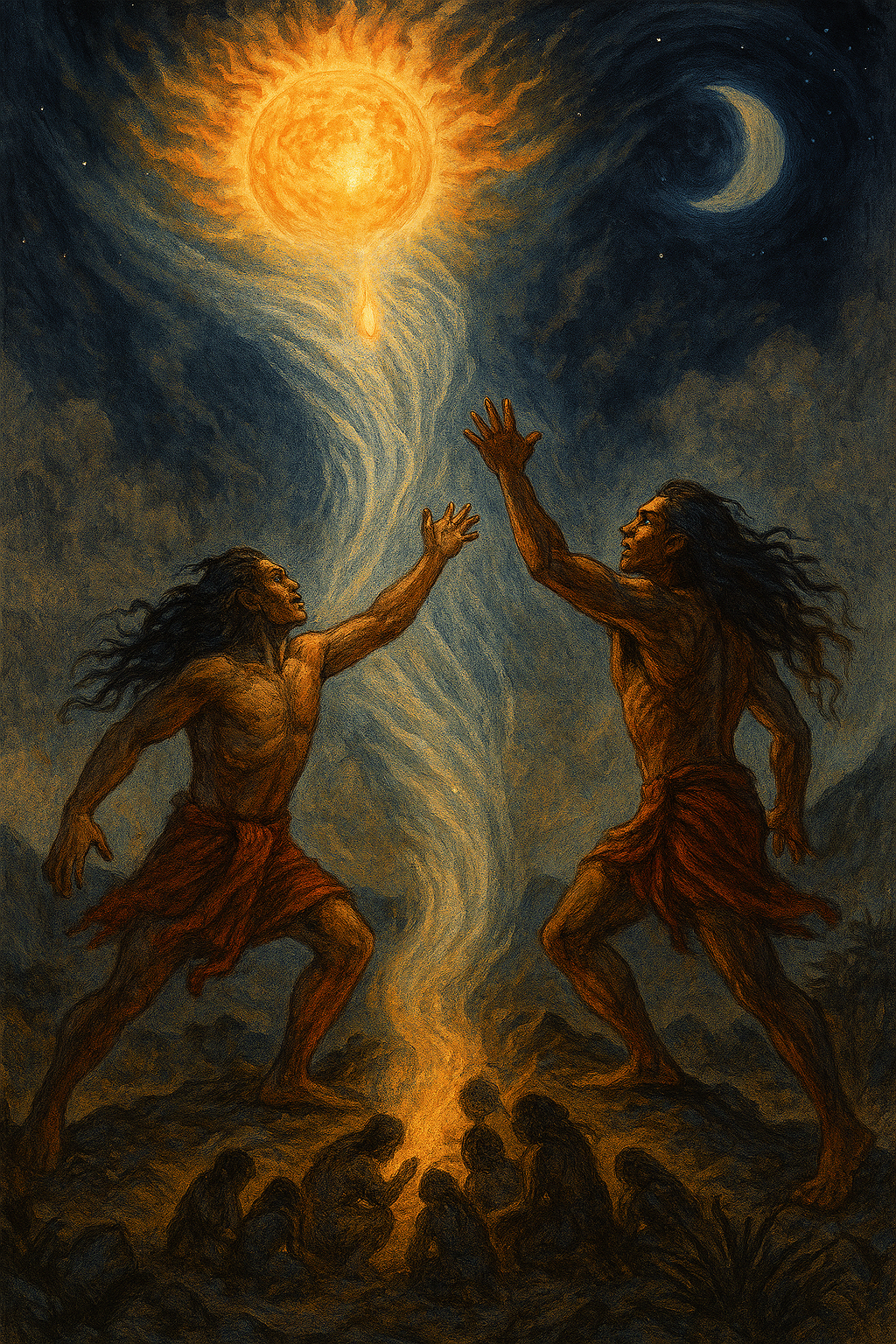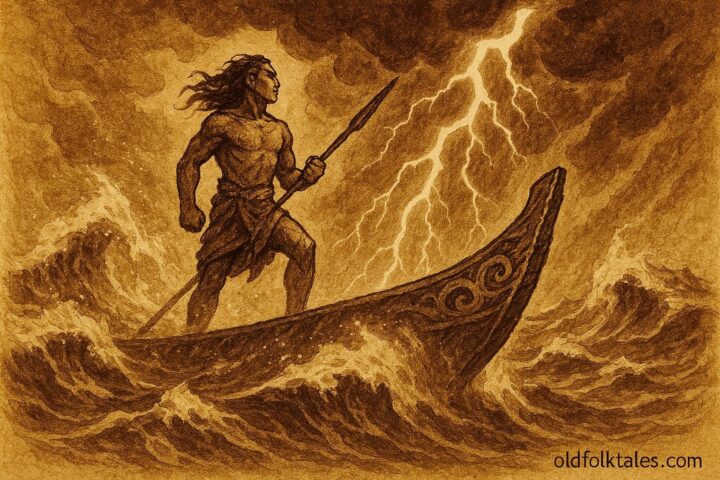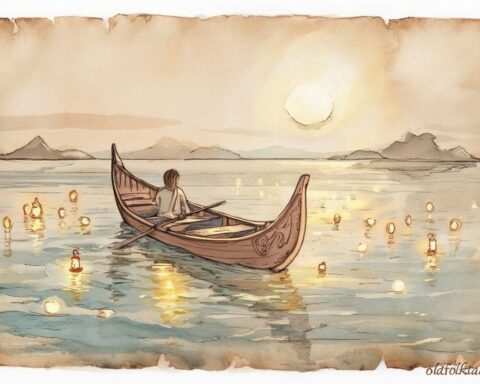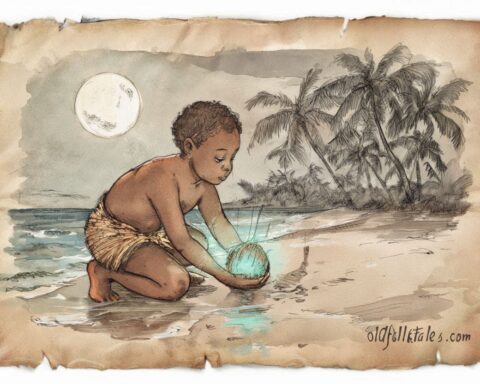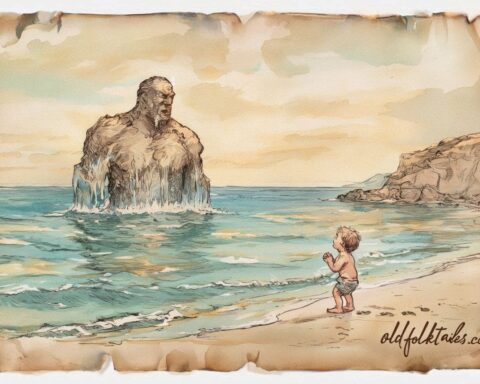In the time before time, when the world was young and unformed, darkness ruled the earth. The people of Aneityum Island lived in shadows, shivering through cold nights without warmth or light to comfort them. They huddled together for what little heat their bodies could share, but it was never enough. The chill seeped into their bones, making every movement painful, every breath a labor.
But the darkness brought more than cold, it brought hunger of a different kind. Without fire, the people could not cook their food. They ate everything raw: fish pulled fresh from the sea, their flesh cold and slippery; roots dug from the earth, hard and difficult to chew; fruits and vegetables that might have been sweet if heated but were bland and tough in their natural state. Their stomachs were never truly satisfied, and their bodies grew weak from this primitive existence.
Click to read all Melanesian Folktales — rich oral storytelling from Papua New Guinea, Fiji, Solomon Islands, and Vanuatu
High above the earth, beyond the reach of mortal hands, the Sun and Moon kept fire for themselves alone. In their celestial homes, flames danced and crackled, filling the heavens with warmth and light. The Sun carried fire in his daily journey across the sky, his brilliant heat radiating down upon the earth but never sharing the precious flame itself. The Moon, too, guarded her own fire, softer and gentler than the Sun’s, but equally distant and unreachable.
The fire was kept in a sacred stone, ancient and powerful, that rested in the Sun’s domain. It was from this stone that all celestial light emanated, and it was this stone that held the secret the people so desperately needed. But the heavens were far away, separated from the earth by an immeasurable distance that no person could cross. The sky stretched endlessly above, beautiful but untouchable, holding its treasures beyond the grasp of suffering humanity.
On Aneityum Island lived two brothers, Jumas Juma and Lecap Lecap. They were known throughout the land for their strength, their cleverness, and their deep love for their people. Every night, as they sat in the cold darkness with their families, they watched the people suffer. Children cried from the chill, elders grew frail without warm food, and everyone struggled to survive in this harsh, fireless world.
The brothers’ hearts ached with the pain of their people. While others had grown resigned to their fate, accepting the cold and darkness as the unchangeable way of things, Jumas Juma and Lecap Lecap refused to surrender to despair. They would lie awake long after others had fallen into fitful sleep, staring up at the stars and the Moon’s pale glow, knowing that somewhere up there, fire existed warm, bright, and life-giving.
“There must be a way,” Jumas Juma would whisper to his brother in the darkness.
“There must be,” Lecap Lecap would reply, his voice filled with determination.
The brothers spent many days and nights in contemplation, studying the sky, watching the movements of the Sun and Moon, thinking and planning. They could not grow wings and fly to the heavens. They could not climb the sky as one climbs a tree. But they understood the power of the natural world, the forces that moved between earth and sky.
They understood the wind.
Wind was the bridge between earth and heaven. It rose from the ground and soared upward, touching the clouds, dancing with the birds, reaching places that no foot could tread. If they could harness the wind, if they could command it with enough strength and purpose, perhaps just perhaps it could reach the Sun’s home itself.
The brothers began their great work. They called upon all the knowledge they possessed, all the power they could summon from the earth and air. They stood together on the highest point of Aneityum Island, where the land reached closest to the sky, and there they began to create wind.
At first, it was just a breeze, gentle and uncertain, rustling the leaves of the trees and stirring the grasses at their feet. But the brothers did not stop. They called louder, with voices that rang across the island. They moved their arms in great sweeping motions, pulling the air around them, gathering it, directing it upward with all their will and strength.
The breeze became a gust. The gust became a gale. The wind began to howl and roar, swirling around the brothers in a mighty spiral that reached toward the heavens. The trees bent nearly double under its force. The sea churned and frothed. The very earth seemed to tremble with the power of what the brothers were creating.
Still, they did not stop.
Higher and higher the wind rose, a column of pure force ascending from the earth like a living thing. It pushed through the lower sky, past the clouds where rain was born, past the realm where birds could fly, up into the thin air where the Sun made his home. The wind grew so strong that it could shake the foundations of heaven itself.
In his celestial dwelling, the Sun felt his home tremble. The sacred stone where fire was kept began to rattle and shake, disturbed for the first time since the world began. The wind that the brothers had created buffeted the stone, pushing and pulling at it with relentless force. The Sun tried to hold it steady, but the power of the brothers’ wind was too great, born as it was from desperation and love for their suffering people.
With a sound like thunder, a single spark broke free from the stone. It was tiny, barely visible, but it glowed with the concentrated essence of fire itself all the warmth and light that humanity needed, compressed into one brilliant point. The spark tumbled from the stone and began its long fall toward earth, carried down by the very wind that had shaken it loose.
Jumas Juma and Lecap Lecap watched the sky with hope burning in their hearts. They saw it a distant point of light, falling like a star, growing brighter as it descended. The spark was coming to earth, but they knew it was fragile. If it struck the ground, it might be extinguished. If it fell into the sea, it would be lost forever. They had to catch it, to give it a home where it could survive and grow.
Quickly, the brothers found a fallen tree branch, old and hollow in the center. The wood was dry, perfect for nurturing a flame. They held it up as the spark fell, positioning themselves carefully, their eyes fixed on that precious point of light descending from the heavens.
The spark fell true, guided perhaps by fate or by the same power that had allowed the brothers to shake the heavens. It landed inside the hollow of the branch, nestling into the dry wood like a seed planted in fertile soil. For a moment, nothing happened, and the brothers held their breath, fearing they had failed.
Then, a curl of smoke rose from the branch. The spark had caught. A tiny flame flickered to life, fed by the dry wood of the hollow. It grew slowly, steadily, as the brothers carefully protected it from the wind that still swirled around them. They had done it. They had brought fire to earth.
The brothers carried their precious burden down from the mountain, walking carefully to protect the infant flame. When they reached their village, they placed the burning branch in a prepared hearth a circle of stones that would contain the fire and keep it safe. They fed it with more wood, and the flame grew stronger, brighter, warming the circle of amazed people who gathered around it.
For the first time in human memory, the people of Aneityum Island felt true warmth. The fire’s heat pushed back the cold that had plagued them for so long. Its light drove away the darkness, creating a circle of safety and comfort. The people wept with joy and gratitude, reaching out their hands to feel the warmth radiating from the flames.
That night, they cooked their first meal. Fish and roots that had always been eaten raw were placed near the flames, and their flesh transformed. The fish became flaky and tender, its flavor deepened and enriched. The roots softened and became sweet. Food that had been merely sustenance became something wonderful, something that brought not just nutrition but pleasure and satisfaction.
From that first hearth, fire spread across Aneityum Island and beyond. The people learned to carry it, to nurture it, to keep it burning through the generations. They built their homes around hearths, gathering there for warmth, for cooking, for light, and for fellowship. The fire became the center of their lives, the heart of every home, the place where families came together and stories were told.
And always, when they sat around their fires, the people remembered Jumas Juma and Lecap Lecap, the two brave brothers who had refused to accept darkness and cold as humanity’s fate. They remembered how the brothers had called the wind from the earth to shake the heavens, how they had caught the falling spark, and how they had brought the gift of fire to all people.
The Sun and Moon still travel their paths across the sky, still keeping their celestial fires. But now, earth has fire too dancing in every hearth, glowing in every home, warming every family that gathers around it. The light that once belonged only to the heavens now belongs to humanity as well, a gift won through courage, determination, and the unbreakable bond between two brothers who dared to reach for the impossible.
Explore tales of ancestral spirits and island creation that connect people to the land and sea
The Moral of the Story
This powerful legend teaches us that even the most impossible challenges can be overcome when we refuse to accept injustice and suffering as unchangeable facts of life. Jumas Juma and Lecap Lecap show us that courage combined with cleverness can achieve what seems beyond reach, and that working together with those we trust multiplies our strength. The story reminds us that the comforts we enjoy today warmth, light, cooked food were won through the bravery of those who came before us, and we should never take these gifts for granted. Most importantly, it teaches that when we act from love for our community and determination to end suffering, we can literally bring light into darkness and warmth into cold, transforming the world for all who come after us.
Knowledge Check
Q1: What was life like before fire existed on Aneityum Island? A: Before fire, the people of Aneityum lived in cold darkness, suffering constantly from the chill. They had to eat all their food raw fish, roots, and vegetables which made meals unsatisfying and difficult to digest. Without warmth or light, life was harsh and survival was a daily struggle.
Q2: Who possessed fire before humans in this Vanuatu legend? A: Only the Sun and Moon possessed fire in their celestial homes high above the earth. The fire was kept in a sacred stone in the Sun’s domain, far beyond the reach of mortal people, and the heavenly beings did not share this precious gift with humanity.
Q3: How did the brothers Jumas Juma and Lecap Lecap obtain fire from the sky? A: The brothers created a great wind so powerful that it rose from earth all the way to the Sun’s home in the heavens. This mighty wind shook the sacred stone where fire was kept, causing a single spark to break free and fall to earth, where the brothers caught it in a hollow tree branch.
Q4: What is the symbolic meaning of the hollow tree branch in this story? A: The hollow tree branch symbolizes preparation and receptivity the brothers didn’t just reach for fire, they created a proper vessel to receive and nurture it. This represents the wisdom of being ready to receive gifts and the importance of having the right tools and preparation to preserve precious things.
Q5: What cultural significance does fire hold in this Melanesian origin story? A: Fire represents the transformation of human existence from mere survival to true living. It symbolizes the courage to challenge the divine order when humanity suffers, and demonstrates that determination and unity can bring heavenly gifts to earth. Fire became the center of home and community life, representing warmth, nourishment, safety, and fellowship.
Q6: What does this legend teach about the relationship between humans and nature? A: This story teaches that humans can work with natural forces like wind to achieve seemingly impossible goals. It shows that understanding and harnessing nature’s power, rather than fighting against it, allows people to bridge the gap between earth and heaven. The brothers didn’t conquer nature; they cooperated with it to bring about transformation.
Source: Adapted from oral tradition of Aneityum Island as recorded in ethnographic studies of Vanuatu mythology.
Cultural Origin: Melanesian mythology, Aneityum Island, Vanuatu, South Pacific
